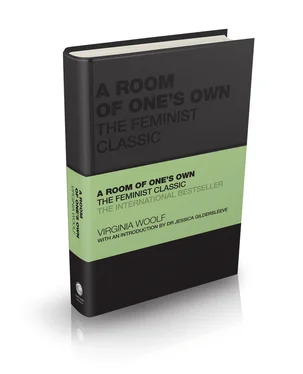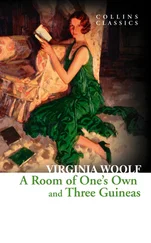Critics have noted contradiction, bias, and snobbery throughout A Room of One's Own . Her critique of the ‘awkward break’ in Charlotte Bronte's Jane Eyre (1847), in which the narration is interrupted by an angry monologue on women's oppression, seems to show little tolerance for emotion, so often coded as hysteria, in political discussion. And Madelyn Detloff (2012) points to an attitude of disgust towards the working class in Woolf's observation that ‘genius like Shakespeare's is not born among laboring, uneducated, servile people … It is not born today among the working classes.’
It could be said that Woolf's snobbishness is a function of her expectations about art and her own ambitions, rather than a failure to account for feminism's intersections, as Anne E. Fernald (2006) suggests. Still, Woolf's ambition, she adds, does appear to emphasise individualism at the expense of values of communal feminism.
Other critics see these contradictions as necessary to Woolf's argument. Angeliki Spiropoulou (2012) contends that she uses these conflicts as not only a symptom of modernity, which ‘fosters antithetical thoughts, extreme sensations and ambivalent emotions,’ but more precisely ‘a means of pointing to an injustice that needs to be critiqued and corrected.’ Indeed, Kathleen Wall (1999) argues that the essay's argumentative structure ‘allows her to pursue truth while affirming its problematic status.’
Paradoxically, Woolf's adoption of multiple perspectives and possibilities is related to her idea of ‘unity’ of mind:
‘What does one mean by “the unity of the mind”? I pondered, for clearly the mind has so great a power of concentrating at any point at any moment that it seems to have no single state of being. It can separate itself from the people in the street, for example, and think of itself as apart from them, at an upper window looking down on them. Or it can think with other people spontaneously, as, for instance, in a crowd waiting for some piece of news read out … Clearly the mind is always altering its focus, and bringing the world into different perspectives.’
It is only when the mind cooperates or fuses with the characteristics of the opposite sex, however, that it finds a ‘natural’ ease. ‘[A] great mind is androgynous,’ Woolf writes. ‘It is when this fusion takes place that the mind is fully fertilised and uses all its faculties.’
It is not only the ‘great mind’ of the writer that is important here, then, but the great mind of the reader, who must come to hold these contradictions in balance if they are to understand the advantages as well as the problems of Woolf's position on women.
A Room of One's Own does not – indeed, cannot – resolve these contradictions. From the first, Woolf warns us that ‘I should never be able to fulfil what is, I understand, the first duty of a lecturer to hand you after an hour's discourse a nugget of pure truth to wrap between the pages of your notebooks and keep on the mantelpiece for ever.’ No conclusion can be reached.
Instead, A Room of One's Own ends only with an injunction that the reader, the student, the apprentice writer, must work for the coming of Shakespeare's sister, that woman forgotten by history: ‘I maintain that she would come if we worked for her, and that so to work, even in poverty and obscurity, is worthwhile.’
The room and the money are the ideal, we come to see, but even without them the woman writer has a duty to write, think, and work, in anticipation of a future for her daughters to come.
1 Detloff, Madelyn. ‘“Am I a Snob?” Well, Sort Of: Socialism, Advocacy, and Disgust in Woolf's Economic Writing.’ Contradictory Woolf. Ed. Stella Bolaki and Derek Ryan. Liverpool: Liverpool UP, 2012. 181–5.
2 Favre, Valérie. ‘A Room of One's Own's (Resistance to) Feminist Interpretations and Feminism.’ Études Britanniques Contemporaines 58 (2020). https://doi.org/10.4000/ebc.9184.
3 Fernald, Anne E. ‘A Room of One's Own, Personal Criticism, and the Essay.’ Twentieth Century Literature 40.2 (1994): 165–89.
4 Virginia Woolf: Feminism, and the Reader. New York: Palgrave Macmillan, 2006.
5 Gan, Wendy. ‘Solitude and Community: Virginia Woolf, Spatial Privacy and A Room of One's Own.’ Literature & History 18.1 (2009): 68–80.
6 Marcus, Laura. ‘Woolf's Feminism and Feminism's Woolf.’ The Cambridge Companion to Virginia Woolf. Ed. Susan Sellers. 2nd edn. Cambridge: Cambridge UP, 2010. 142–79.
7 Parkes, Adam. ‘Lesbianism, History, and Censorship: The Well of Loneliness and the Suppressed Randiness of Virginia Woolf's Orlando.’ Twentieth Century Literature 40.4 (1994): 434–60.
8 Rosenman, Ellen Bayuk. ‘Sexual Identity and A Room of One's Own: “Secret Economies” in Virginia Woolf's Feminist Discourse.’ Signs 14.3 (1989): 634–50.
9 Saloman, Randi. ‘“Unsolved Problems”: Essayism, Counterfactuals, and the Future of A Room of One's Own.’ Tulsa Studies in Women's Literature 32.1 (2013): 53–73.
10 Solomon, Julie Robin. ‘Staking Ground: The Politics of Space in Virginia Woolf's A Room of One's Own and Three Guineas.’ Women's Studies 16 (1989): 331–47.
11 Spiropoulou, Angeliki. ‘Woolf's Contradictory Thinking.’ Contradictory Woolf. Ed. Stella Bolaki and Derek Ryan. Liverpool: Liverpool UP, 2012. 101–7.
12 Stevenson, Christina. ‘“Here Was One Room, There Another”: The Room, Authorship, and Feminine Desire in A Room of One's Own and Mrs Dalloway.’ Pacific Coast Philology 49.1 (2014): 112–32.
13 Sullivan, Melissa. ‘“She Was No ‘Genius’”: Virginia Woolf and Women's Middlebrow Fiction.’ Virginia Woolf Miscellany 83 (2013): 15–17.
14 Wall, Kathleen. ‘Frame Narratives and Unresolved Contradictions in Virginia Woolf's A Room of One's Own.’ Journal of Narrative Theory 29.2 (1999): 184–207.
15 West, Rebecca. ‘Autumn and Virginia Woolf.’ Ending in Earnest: A Literary Log. New York: Doubleday, 1931.
16 Woolf, Virginia. ‘Professions for Women.’ 1931. The Collected Essays of Virginia Woolf. Oxford: Benediction, 2011.
17 Ziarek, Ewa Plonowska. ‘Woolf's Feminist Aesthetics: On the Political and Artistic Practice in A Room of One's Own.’ Parallax 16.4 (2010): 70–82.
ABOUT JESSICA GILDERSLEEVE
Jessica Gildersleeveis Associate Professor of English Literature at the University of Southern Queensland, and has a PhD from the University of Bristol. She has written on twentieth‐century women writers including Elizabeth Bowen, Rosamond Lehmann, Rose Macaulay, Jean Rhys, and Virginia Woolf. Her research interests include cultural narratives, modernism, the Gothic, and Australian literature. Books include Christos Tsiolkas: The Utopian Vision (2017) and Elizabeth Bowen: Theory, Thought and Things (2019). She is editor of The Routledge Companion to Australian Literature (2021).
Tom Butler‐Bowdonis the author of the bestselling 50 Classics series, which brings the ideas of important books to a wider audience. Titles include 50 Philosophy Classics , 50 Psychology Classics , 50 Politics Classics , 50 Self‐Help Classics and 50 Economics Classics .
As series editor for the Capstone Classics series, Tom has written Introductions to Plato's The Republic , Machiavelli's The Prince , Adam Smith's The Wealth of Nations , Sun Tzu's The Art of War , Lao Tzu's Tao Te Ching , and Napoleon Hill's Think and Grow Rich .
Tom is a graduate of the London School of Economics and the University of Sydney.
Читать дальше











